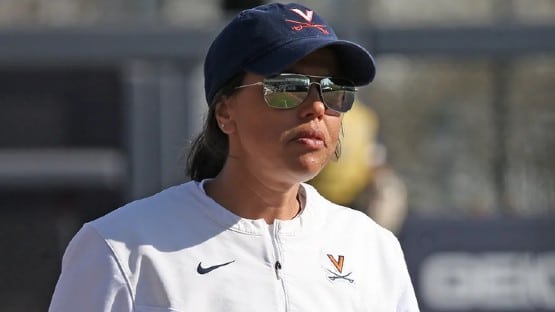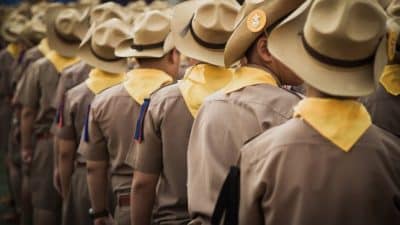The Top Story by Chris Graham
Daryl Davis has plenty of detractors – people who question his motives for wanting to meet with white supremacists, who wonder why an African-American man would of his own volition attend rallies of the Ku Klux Klan, who outright doubt his stories of conversions of racial separatists as being pure fantasies.
The Maryland-based activist and blues musician has a ready answer for them.
“What I say to them is, hey, look, I’ve got these robes and hoods hanging in my closet. That’s what I’ve done to put a dent in racism. Show me how many robes and hoods you have hanging in your closet. What have you done besides sit around and talk about what should be done?” Davis told The Augusta Free Press.
Davis wrote a book about his experiences, Klan-Destine Relationships: A Black Man’s Odyssey in the Ku Klux Klan, that was published in 1997. He has been touring the country since then – including a talk at Bridgewater College last month – to share what he says he has learned from his meetings with people who see the world very much differently from how he does.
“There’s nothing wrong with groups that are, say, antiracist groups or whatever, who sit around and talk about, what can we do, racism is bad, da-da-da-da-da. But they sit around and talk to each other. They don’t want to talk to the Klan. They don’t want to talk to the American Nazi Party, the Neonazis, the White Power Skinheads or whoever. Because they don’t have the same ideology that we multicultural people do,” Davis said.
“What good does it do if you’re not a racist, and I’m not a racist, what good does it do for me to talk to you about racism? We both agree. So let’s go find somebody who does not agree with us, and let’s invite that person to tell us why he or she does not agree. Let’s listen to them. Give them their respect, and in turn, they may reciprocate and listen to us,” Davis said.
For all the attention that Davis has received – he has been the subject of newspaper articles too numerous to mention, and his story has been featured on CNN – he is barely on the radar of groups like the New York City-based Anti-Defamation League and the Birmingham, Ala.,-based Southern Poverty Law Center that regularly monitor the activities of white supremacists.
“He’s certainly not what you’d consider a major player or anything of the sort,” said Mark Pitcavage, the director of fact finding at the Anti-Defamation League.
“I know almost nothing of this person,” said Mark Potok, the editor of Intelligence Report, a quarterly published by the Southern Poverty Law Center.
“I do know that he has written a book about meeting with Klan members that he says he talked into rescinding their ties with the group. But I don’t personally know of any actual Klan members that he has talked to who have since decided to leave the Klan,” Potok said.
“I’ve been involved in actively tracking these groups for many years, and I’ve not heard one story of a Klan member who decided to leave after meeting with him,” Potok told the AFP.
Another person offering questions on Davis and his work is Jared Taylor, the president of the Oakton-based New Century Foundation and the editor of the monthly American Renaissance, which bills itself as “America’s premiere publication of racial-realist thought.”
“I’ve never heard of this guy, and I’ve also never heard of anyone in a white racial-consciousness group who has dissociated themselves from that group and changed their way of thinking as a result of meeting with a black man,” Taylor told the AFP.
“It would seem to me that somebody going in as a black man to speak to white men and women about racial-consciousness issues who have strong feelings on those issues would have a hard time convincing them to see things his way,” Taylor said.
“There have certainly been well-known people who have claimed conversions and been paraded out by the ADL and the Southern Poverty Law Center and others as being people who have changed their ways that will tell anybody who will listen how much the people that they used to associate with are jerks and things of that nature. So the fact that they say that they don’t know anything about him says something,” Taylor said.
“If he has been successful in doing what he has said that he has done, then he has an interesting story to tell. But I think it is right to have some healthy suspicions about him and who he says he is,” Taylor said.
Thomas Robb, the national director of the Harrison, Ark.,-based Ku Klux Klan, has more than simple healthy suspicions about Davis.
“I think he’s using the Klan to make a name for himself,” Robb said of Davis.
“I’ve never heard of him, and you would think that I would have. I’ve been involved in this movement for 40 years, and I know a lot of people who travel in these circles,” Robb told the AFP.
“You would think that had he done the kinds of things that he claims to have done, then people would be talking about him. And if he had made even one person or two people change their minds, then that would have gotten around,” Robb said.
Davis points to the robes and the hoods that he says he has hanging in his closet – and the friends that he says he has made out of one-time white supremacists over the years.
“I didn’t get into this expecting to make any friends. I didn’t think that was possible,” Davis said.
His goal, he said, was to get information on what makes groups like the KKK click. But in his get-togethers with supremacists, he learned – and they did as well, he said – “that we had more in common than we had in contrast.”
“Basically the only thing that we had in contrast was how we felt about skin color. I thought people of different skin colors could be together. They thought, no, they should be apart. But we might agree on the same movies or the same jokes or whatever. So I would work on things that we had in common – like we need better education for kids, we need to eradicate drugs off the streets, things like that, things that we could all agree on. And the more things we can find in common, the less things that we had in contrast began to matter,” Davis said.
Davis concedes that his methods “are not commonly accepted by most people.” But then “most people,” he said, “prefer to remain in a place of little tension, where they don’t have to confront the world.”
“People say to me, Daryl, why do you keep talking about the Klan? Why do you keep talking about the Nazis? Why don’t you just ignore them?” Davis said.
“Some things you cannot ignore. If you go to the doctor for a checkup, and the doctor says, I hate to tell you this, but you’re in the beginning stages of lung cancer. You can’t say, well, I’ll just ignore it, and it will go away. Because if you try to ignore it, it metastasizes – it spreads and consumes the whole body,” Davis said.
“Racism is a cancer. It cannot be ignored. It must be treated,” Davis said.
Pitcavage cautions that these kinds of treatment methods are rarely if ever successful.
“It’s extremely difficult to convert someone who has strong ideological ideas on race issues, the same as it is extremely difficult to convert someone who has strong ideas on religion. You’re almost always going to be unsuccessful in these attempts,” Pitcavage told the AFP.
“Basically, extremists undergo these kinds of conversion experiences for one of three reasons,” Pitcavage said. “One, there is some kind of long-term disillusionment with the direction of the movement that leads them to change their minds. Two, there’s a life-changing experience, for example, the birth of a child who has birth defects and is seen by those in the white-supremacy movement as not being part of the master race, and yet as a parent you feel love for the child, and it makes you question your beliefs. Last is being shocked out of it – being arrested, convicted and sentenced for a criminal act that makes you realize that you’ve gotten yourself in a lot of trouble, and over what?
“These are the three most common conversion experiences, and none of them are exactly common, if you know what I mean when I say that,” Pitcavage said.
Davis responds that he doesn’t have “any special powers, any special skills.”
“I think if anybody like myself, just a rock-n-roll piano player, can make a change in someone’s life who literally hated me for no other reason than the color of my skin, just because I sat down and talked and communicated with these kinds of people, who’s to say what we all can do if we just try?” Davis said.
“It amazes me how here in this country we call ourselves the greatest nation in the world. Perhaps in some respects we are. But we have the ability to put a man on the moon. And while that man is on the moon walking around, we can be here on Earth and talk to the man live via a satellite-radio phone,” Davis said.
“Everybody in this room has e-mail,” Davis said. “We can sit on our e-mail and talk to somebody all the way in Australia, Japan, Russia, Africa – instantly, we can talk back and forth. Why is it that we can talk to people as far away as the moon, as far away as some other continent, but we cannot talk to the person right next door to our house, because they are of a different color, a different ethnicity, a different religion, a different sexual persuasion?
“It seems to me that before we can call ourselves the greatest nation on the face of this Earth, our ideology needs to catch up with our technology,” Davis said.
(Published 02-06-06)










